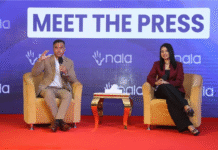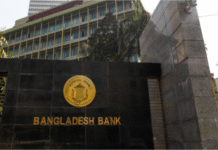
Depositors across Bangladesh are yanking savings out of the country’s crisis-hit banks, despite official assurances that deposits are safe. (Nikkei montage / Source photos by Reuters and AFP/Jiji)
DHAKA — Businessman Abul Kalam Azad has deposited his money at Basic Bank in Dhaka for years, trusting that the state-owned lender was a secure place to park his savings.
But the South Asian nation’s financial sector is reeling from a liquidity crisis amid accusations of bank executives’ dubious dealings and billions of dollars in bad loans. Bangladesh’s central bank in March ordered the merger of 10 of the country’s 61 private and state-owned lenders in a bid to fix their battered balance sheets and keep them afloat, leading to a crisis of confidence among savers.
“I don’t know what could happen with the bank under private-sector management,” said 45-year-old Azad, worried about plans to force his bank to merge with a private lender. “So, I’m taking my money out.”
Depositors across Bangladesh are yanking savings out of the country’s crisis-hit banks, despite official assurances that the deposits of any merged lenders will be “completely safe and secured.”
Azad and other nervous Basic Bank clients pulled more than $210 million out of their accounts in a matter of days when branches reopened after a brief closure during the Muslim fasting month of Ramadan in April, according to the lender.
“We have [also] received scores of withdrawal requests from our institutional depositors,” Basic Bank Deputy Managing Director Abu Md Mofazzal told Nikkei Asia.
Employees at Basic, which suffered a 22.65 billion taka ($193 million) loan scandal a decade ago, have written to management to express fears over their future. In a letter sent to Bangladesh’s finance minister, they warned that the “unusual” spate of withdrawals was hurting the bank’s ability to perform day-to-day business — a problem afflicting the sector.
“A severe liquidity crisis has been created … due to the panic,” the letter said. “If the present situation does not improve, the bank may be forced to dishonor checks at any time.”
Central bank spokesperson Mezbaul Haque had earlier justified the merger initiative by saying, “We are merging weak banks with strong ones that have proven track records with a hope that they may be able to make a turnaround.” The mergers are expected to take about three years.
Together, the country’s lenders have about $12.5 billion worth of loans at risk of default, with many already written off as nonrecoverable, according to Bangladesh Bank.
At the end of 2022, Bangladesh had the second-highest rate of nonperforming loans (NPLs) — 9.4% — among South Asian nations after Sri Lanka at 10.9%, a World Bank report said last year.
The issue has not escaped the notice of the International Monetary Fund, which agreed last year to supply Bangladesh with a $4.7 billion loan to replenish its depleting foreign exchange reserves. Both the IMF and World Bank have raised concerns about bank failures with the government.
Aggravating the problem are claims that the sector has for years been granting loans on forged documents in exchange for kickbacks to bank officials. Executives and others have been charged over allegations that loans were issued to nonexistent companies.
In March, a Dhaka court handed life sentences to Tanvir Mahmud, former managing director of Hallmark Group, and his wife for their role in Bangladesh’s biggest-ever loan scam at Sonali Bank. Seven others also got life sentences in the $300 million debacle more than a decade after it came to light — not an unusual time lag in the country’s sclerotic justice system.
The roots of the financial sector’s problems lay in political patronage which paved the way for dozens of banks to open in the last few decades following the ouster of an autocratic government, observers said.
Over 20 new banks were granted licenses to operate between 1992 and 2001 with scores more opening their doors in the past 15 years under the ruling Awami League government.
Under the merger plan, Padma Bank will join with Exim Bank, Bangladesh Development Bank is to merge with Sonali Bank, Rajshahi Krishi Unnayan Bank joins forces with Bangladesh Krishi Bank, National Bank merges with United Commercial Bank and BASIC Bank combines with City Bank.
Salehuddin Ahmed, a former central bank governor, lays much of the blame on bank directors for the sector’s “sorry state” along with “wrong policies” and a lack of proper monitoring by his former employer, Bangladesh Bank.
“The problem has now turned very serious,” Ahmed said. “Bangladesh’s tiny economy never ever needed 61 banks, but they got approval on political considerations.”
Ahmed called for tougher action against bank executives, as he cast doubt on the merger plan, saying that it “alone won’t solve the present crises.”
“Mergers are an initial step to resolve the problems but it is not an optimum solution,” said Mustafa Kamal Mujeri, executive director at the Institute for Inclusive Finance and Development. “We have nurtured the problems for a long period instead of taking proper steps to lessen it.”
Mashrur Arefin, vice-chairman of the Association of Bankers Bangladesh, countered that the merger plan can work with policy support from the government. Arefin is also managing director and CEO of City Bank.
National Bank customer Abul Kashem isn’t so sure. His once-venerable lender, which was also hit by an embezzlement scandal, is pushing back against orders to merge with rival United Commercial Bank. The merger announcement sparked a frenzied withdrawal of deposits.
“National Bank was once a very healthy bank, but is now merging with another,” Kashem said. “The future … is uncertain.”
source : asia.nikkei










